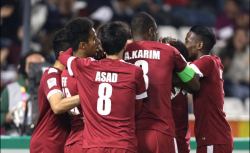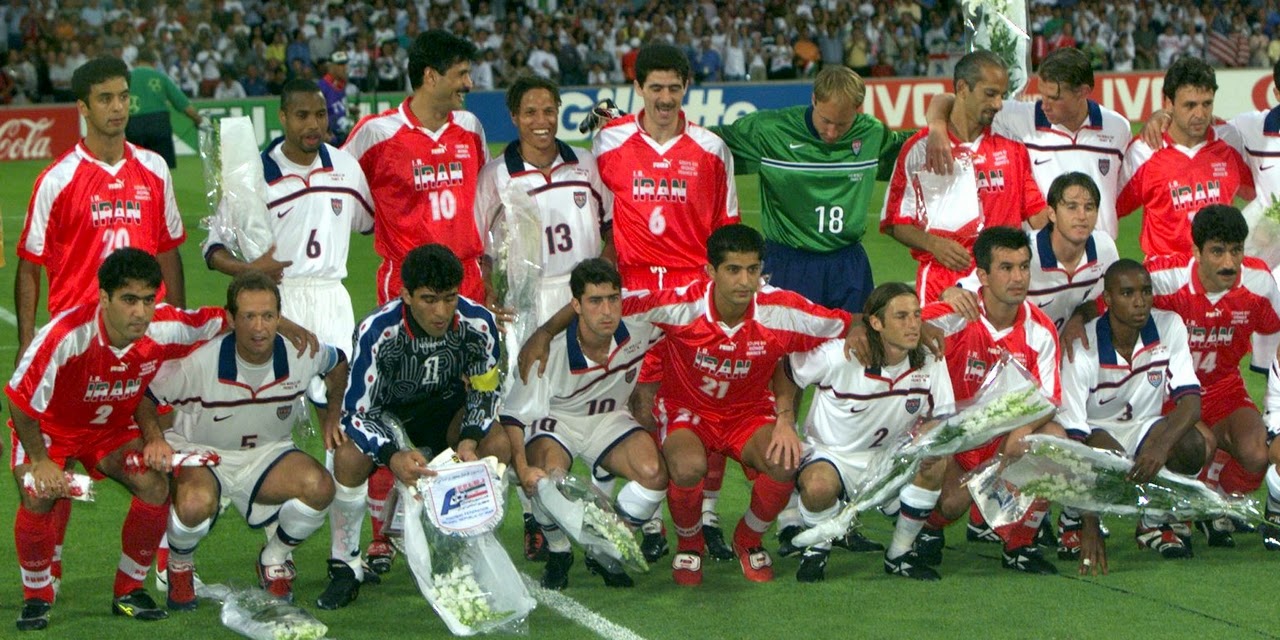The Gulf crisis, Fossati’s resignation and the naturalisation conundrum
At the final whistle, there was elation and relief all around. Each player expressed it in different ways – Akram Afif, who had been taken off after an impressive show, sprinted from the substitutes bench and jumped onto his teammates. Rodrigo Tabata gestured to his ‘Sheikh Tamim’ t-shirt while Pedro kissed his badge. As for Abdelkarim Hassan, he simply burst into tears. Man of the match Hassan Al-Haydos said those were ‘tears of happiness.’
Qatar’s 3-2 win over South Korea on Tuesday night was a massive result for many reasons. For one thing, it was a big step up from what had been a series of dismal performances throughout the 2018 World Cup qualifying campaign. Even though there was a feeling of too-little-too-late, the result kept alive Qatar’s faint hopes of finishing in the third place playoff spot.
However, none of that seemed to matter for the team or the fans. The match was an emotionally charged affair for a completely different reason. The ongoing crisis in the Gulf, between Qatar and its neighbours, meant that the match would always be played under its shadow. One week on since the crisis broke, there was no bigger issue on people’s minds. This was why the players had worn t-shirts with the Emir’s face on it during pre-match warmup. This was also why Afif and Al-Haydos celebrated their goals with salutes. It was a show of loyalty and love for the nation at a time when the nation seemed to need it the most.
And then, all of a sudden, came the news that Qatar’s coach Jorge Fossati had resigned.
At the post-match press conference, the Uruguayan coach expressed his decision to quit, leading to reactions of shock and surprise from all quarters.
What the hell? https://t.co/oIupj5xoZS
— SandalsForGoalposts (@Sandal4Goalpost) June 13, 2017
The reaction from our friends at SandalsForGoalposts was not very different from that of the Qatar Football Association (QFA) president Sheikh Hamad bin Khalifa bin Ahmed Al-Thani. In an official statement put out on Twitter, he said that he was “taken by surprise by Fossati’s decision” and that Qatar U23 coach Felix Sanchez would succeed him if the QFA failed to convince Fossati to stay on.
That brought up the question – was this really a surprise? In the past, the resignation (or more often than not, sacking!) of the national team manager would be followed a period of uncertainty before the QFA finally named the successor. In this case, however, the name of the successor was ready within hours.
What is even more interesting is that Fossati’s resignation had been mooted in the local media weeks before the match against South Korea. If those reports were true, then Fossati had already informed QFA of his decision well in advance, giving them time to decide on his replacement. The names of Sanchez, former Qatar boss Djamel Belmadi and also Al-Sadd’s 70-year old manager Jesualdo Ferreira had done the rounds.
Back when those reports first appeared, it was relatively less surprising because very few people actually expected Qatar to win against South Korea. The Maroon campaign had been written off long before that, after the 0-1 home defeat against Iran in March, to be particular. After that match, a video of a young Qatari fan ranting to a BeIN Sports camera against the naturalised players on the team and their apparent “lack of spirit” went viral on the internet. This is a crucial point to be noted – but more on that later.
“I had big expectations for today’s result, really I am very sad,” Fossati had remarked after that game. He should have expected the backlash from fans and the media. If he had resigned then and there, people would have accepted it without thinking twice. After all, Alex Fergusons are rare in the Middle East. A coach’s job is not known for its job security or longevity. Why would this be any different?
Fossati himself had, in fact, threatened to resign less than two months after he taken up the job. After a particularly dispiriting show in a 0-0 draw in China, criticism had rained down on the naturalised players.
Talk on the street back then had been that QFA had lost all hope in its naturalised players getting them to the 2018 World Cup. And so, the authorities were planning on putting an end to it and focusing instead on the development of a homegrown team for the 2022 edition at home.
When talk of this reached Fossati, he rejected the idea flat out.
In an interview with Doha Stadium Plus, he said: “I heard about a plan to exclude naturalised players and bring in more young Qatari players into the national team. It (discouraging naturalisation) is one point I don’t agree at this stage. I believe the rules in football are made by FIFA. In my opinion, all players who’re naturalised after fulfilling the world governing body’s norms should be treated on par with true Qatari players.”

Fossati was outspoken in his support for naturalisation in Qatar. “France became the world champions with many naturalised players. Germany too. They’re big countries. You just look at Qatar’s population. If Spain can naturalise Diego Costa, Qatar can have 30 of them,” he told Doha Stadium Plus.
This was expected from Fossati. He has always been a supporter of naturalisation. Iraqi fans will remember Fossati’s previous stint as Qatar coach in 2008 when he presided over the inclusion of multiple new naturalised players in the Qatar national team. These included Brazilian-born players Emerson (forever known as Emerson Sheik in his home country!) and Fabio Cesar who helped Qatar to a 2-0 defeat over Iraq. The match turned into a controversy when it was proven that Emerson was ineligible. Iraq appealed but even though Emerson was suspended, Qatar were given a reprieve.
This time around, Fossati pointed to the eligibility and desire of all his players to appear for Qatar, as per FIFA rules.
“There isn’t a single player in our team who’s playing out of obligation. They’re there because they want to be there. And all of them are well within FIFA rules. This is the only thing we need to think of,” he added.
And then, he slipped in a comment. A bombshell.
“If the federation wants to go another way, I’ll respect its decision 100 per cent. And it’ll be better for the Qatar national team to have another coach who supports that view.”
This writer had imagined the possibilities of Fossati leaving his post back then in protest at the QFA’s reported plans. However, it turned out that QFA agreed with the Uruguayan’s assertion that Qatar could still qualify for Russia and that naturalised players were key to it.
But that was in November 2016. Then came March 2017 and the two devastating 0-1 defeats to Iran and Uzbekistan, in the space of five days. Qualification was a bygone dream.
This is where the young Qatari’s rant against naturalisation becomes relevant. And this is where the jigsaw puzzle seems to fall into place. The question on many lips was this: Why should the team persist with these naturalised players even now, after all hope is lost? Isn’t it better to play with the U23 team from now on? Yours truly agreed.
I've said this before & I repeat it again, pls @QFA, forget about 2018! Play with the U23 team for the remaining matches.
— Ahmed Hashim (@AhmedH_93) March 24, 2017
What then about Fossati? I must admit I felt sad for him. Here was a man who had done so much for Qatari football, set to leave the national team job (for the second time too) in disappointment.
As far as Fossati himself was concerned, he had decided enough was enough. None of his plans had worked out. The team kept losing focus and making the same mistakes over and over again. Luck too, didn’t seem to be on his side. He watched his men hit the crossbar and fail to score sitters while also conceding soft goals. The refereeing, Fossati claimed, had also contributed in killing off Qatar’s chances of qualification. And so, reports started to emerge that Fossati would resign after the match against South Korea. Cue rumours of his replacements.
However, without any official confirmation, the rumours remained rumours.
When Tuesday, the 13th of June finally came around, the situation had changed in Qatar. Everything else took a backseat as Saudi Arabia and the UAE led a group of Arab nations in cutting all ties with Qatar a week prior to that. Footballing rumours like who would take up the Qatar job were pushed aside as everyone had to deal with rumours of a different kind. Was BeIN Sports taken off air in Saudi Arabia and the UAE? Were Barcelona shirts with the Qatar Airways name banned? Would Qatar lose the rights to host the 2022 World Cup?

Qatar finally looked like a ‘national team’ on Tuesday night, bolstered by what seemed to be their reaction to the blockade on the country
For the players, however, the match was a way of expressing their emotions loud and clear. After a long series of games fraught with a lack of team spirit and desire to win, evoking despair in its fans, Qatar suddenly took on a new robe against South Korea. It seemed that it took a political crisis to finally kick the team into action. Even with an assortment of nationalities in its squad, Qatar finally looked like a team. Fossati (according to local newspaper Estad Al Doha) said:
“The players have shown their commitment to and love for the Qatari team despite their different nationalities.”
In that context, voices in the media and among fans on Twitter have pointed to the blockade on Qatar proving to be a unifier and motivating factor – a blessing in disguise. One tweep even said: “If only the blockade had started at the beginning (of the qualifying campaign), Qatar would have reached Russia!”
And then, amidst all the delight and celebration, Fossati quietly settled into his seat at the post-match presser and reminded everyone of something they had all forgotten – his resignation.
Why he proceeded with his promise, we might never know. He never made his reasons clear, apart from stating unequivocally that his resignation had nothing to do with the political crisis and that everyone knew of his plans weeks before it. He seems to have made up his mind long ago; even this new ray of hope of qualification won’t change it.
Why are we all surprised then? It undoubtedly comes back to the performance and the emotions we saw on Tuesday night. For a moment, a Qatari fan may have looked away from the mathematical permutations and combinations and thought: “Maybe we can do this.” ‘Doing this’ requires them to win both their remaining games against Syria (away) and China (home) while they would need Uzbekistan to lose their matches against South Korea and Iran. Even then, what is at stake is a playoff spot, four matches away from actual qualification to the World Cup.
Yet, everyone was allowed to dream on this particular night. That dream curiously also had Fossati on board, at least to some Qataris and many other neutral non-Qataris, who thought this was the moment to consolidate the ranks and give the Uruguyan free rein for one last push. Fossati’s clear desire to resign now means that QFA need to quickly move on with their contingency plan to replace him with Sanchez.
So who is Felix Sanchez Bas? The Spaniard was a youth team coach at Barcelona before moving to Qatar’s Aspire Academy, where he oversaw the rise of a golden generation of homegrown talents, who won the AFC U19 Championship, finally made a Qatari reappearance at the FIFA U20 World Cup and finished fourth at the AFC U23 Championship. Stepping up at each youth level as coach of these young stars, Sanchez now looks set to take over the senior national team.
The question now if Sanchez takes over is: what will be his strategy? (A) Will he bring over his golden generation? Or (B) will he continue with naturalization?
Before the 13th of June, the overwhelming majority would have answered ‘A’. His wards, all of who were homegrown, have, in the eyes of the public, demonstrated “national spirit” with their exploits. They would have been welcome to replace their seniors without as much as a second thought.
But now? After downing the Koreans, I’m sure that opinions won’t be as straightforward and easy to state. There will be those who will support retaining the naturalised players, just as Fossati had envisaged.
That takes us to the title of this article: how does it all come together? I feel that the Gulf crisis has given the Qatar national team an unexpected fillip, turning the situation around for Fossati and the QFA and raising important questions about the future course of action for the naturalisation strategy. Because the political talk refuses to go away, even Fossati’s decision to resign was linked to it by some. Although he rejected those insinuations, he has to admit that it was the crisis that changed things for Qatar, and possibly, for his job prospects too. As for naturalisation, the ongoing onslaught on Qatar from Saudi media also featured disparaging reports on the QFA’s naturalisation strategy. That is nothing new; it has always been a source of embarrassment. In fact, it was at the height of the embarrassment back in November that QFA reportedly considered scrapping the whole strategy, prompting the aforementioned furious response from Fossati.
Yet, from all the time I have spent following football in Qatar, there is one thing I have noticed about the popular reactions to naturalisation. Locals only get irked when the naturalised players do not perform as well as expected or show a “lack of spirit”. At all other times, most voices have generally found no reason to reject “good” naturalised players. The distinction between the “good” and the “uninspiring” may be very vague but this is how things stand. If this same team had been overachieving, I don’t think that ranting Qatari kid would have become an internet sensation.
Then again, all those questions are only worth discussing IF Fossati does leave. Ahdaaf‘s man on the ground in Qatar, Jilbin Sam George, believes that he can still be tempted into staying, at least until the 2019 Asian Cup. BeIN Sports reported that Fossati made a cryptic comment saying he would be willing to help the national team in any capacity if asked.
“I love Qatar, I want the best for Qatar.”
Estad Al Doha soon reported that Fossati was interested in staying on in Qatar, taking on the managerial job at newly-promoted QSL side Qatar SC while continuing as the national team coach.
Confusing much? To be honest, you can never know anything for sure here. This is Qatar. This is football. Expect the unexpected. One thing is more or less certain. If the QFA does coax Fossati into staying, then the infusion of the golden generation will have to wait. Naturalisation will continue to reign supreme.
- The Gulf crisis, Fossati’s resignation and the naturalisation conundrum - June 14, 2017
- Ahdaaf Anniversary Special: AhdaafMAG Issue 1 - February 11, 2017
- 2018 World Cup Qualifying: South Korea v Qatar Q&A - October 5, 2016
- 2016/17 QATAR STARS LEAGUE PREVIEW - September 24, 2016
- FRIDAY WITH… SUPER FAN VIJAY BHARADWAJ - August 5, 2016
- QATAR STARS LEAGUE 2015/16 – SEASON PREVIEW - September 10, 2015
- PREVIEW: Al-Hilal vs. Lekhwiya | Asian Champions League 2015 - August 24, 2015
- LEGENDS OF ARABIA: A HISTORY OF FOREIGNERS IN QATAR, PART 3 - July 20, 2015
- LEGENDS OF ARABIA: A HISTORY OF FOREIGNERS IN QATAR, PART 2 - July 15, 2015
- LEGENDS OF ARABIA: A HISTORY OF FOREIGNERS IN QATAR, PART 1 - July 13, 2015
Similar posts
-
 Internationals
Internationals
WCQ2018 Asia: 6 Talking Points from the Middle East
-
 Internationals
Internationals
PRESS TALK: August 31, 2016
-
 AFC Champions League
AFC Champions League
PREVIEW: EL-JAISH VS. AL-NASR | #ACL2016
-
 Scout Reports
Scout Reports
SCOUT REPORT: Akram Afif
-
 Top 5 Goals of the WeekYouth Competitions
Top 5 Goals of the WeekYouth Competitions
BEST GOALS: AFC U-23 CHAMPIONSHIP
-
 Youth Competitions
Youth Competitions
REPORT: QATAR 2-1 IRAN | AFC U-23 CHAMPIONSHIP












